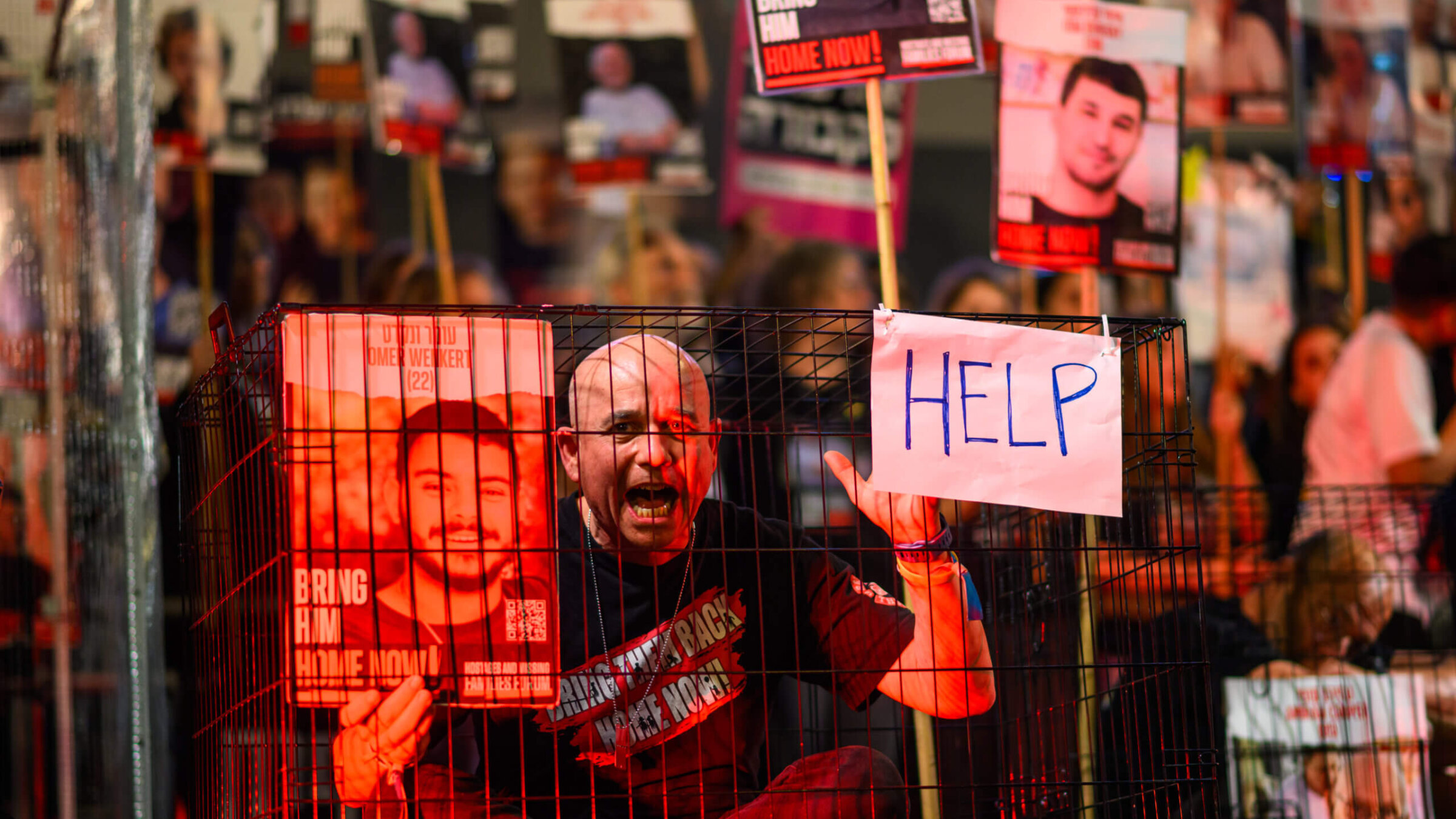My family member is a hostage in Gaza. With Netanyahu in charge, I’m afraid he’ll never make it home
The weekly solidarity rallies for hostage families are now merging with the anti-government protests

A protestor sitting in a cage screams during the ‘Bring them home now’ rally, March 30 in Tel Aviv, Israel. According to the families of hostages forum, this would be the last week a rally is held at Hostages Square, citing that the government is not serious about negotiations, and instead, will be joining anti-government protests. Photo by Alexi Rosenfeld
The crowd was tame and the energy somber at Hostages Square, nothing like most of the anti-government protests that have been taking place on Kaplan Street outside the Ministry of Defense since January 2023. On Kaplan, fires are regularly lit on the highway and police often arrive with water cannons.
But at Hostages Square, outside the Tel Aviv Museum of Art, it was decidedly not a protest, but rather a solidarity movement for the families.
One Saturday night in February I accompanied my cousin, Sharon Alony-Cunio, one of my six family members who were kidnapped by Hamas on Oct. 7, onstage at the weekly rally. She was there to speak about her husband David, who is still held captive in Gaza. I looked out toward a modest crowd of people holding up posters of the many kidnapped faces, while calling to “bring them home,” a plea I had come to resent for its political ambiguity.
This past weekend marked the last Saturday night rally in Hostages Square; from now on, they will be merging with the anti-government protests. This coalition is led by citizens of Israel and calls for the resignation of Prime Minister Benjamin Netanyahu, new elections and a diplomatic deal to return the hostages. It is clear now who the hostage families are holding responsible, and what they are asking for.
While hostage families including my own have certainly been critical of Netanyahu and the war cabinet, the official demands have remained politically neutral and are led by an emotional expression of desperation. But now, that is changing. It appears that the dam is breaking, and ushering the way toward a more unified political movement between some of the hostage families, our supporters and the Israeli left.
Tens of thousands of demonstrators gathered in Tel Aviv over this past weekend, displaying a range of signs declaring slogans such as “Deal now,” “We are all hostage families” and “Only peace will bring security.” More than 100,000 people demonstrated in front of the Knesset in Jerusalem. The official Bring Them Home Instagram account run by the Hostages and Missing Families Forum even posted a photo of the anti-government protest with the caption: “We need you with us. A deal is possible. No more delays, no more excuses.”
Early on in the war, I was consumed by a dark cloud that hung over me throughout my advocacy for them. I felt especially left behind by the liberal community I belong to here in America who could not help me hold my grief, which I described in an essay I wrote for The New York Times. Hostage families like mine were begging for mercy, desperately advocating to our governments in the hopes that they would make choices as if our captured family was their own. How could anyone make a clear political demand from that place? Anyone would feel helpless.
The Bring Them Home campaign emerged to help us raise awareness about our loved ones in captivity, but as a movement it has fallen prey to the interpretation of political extremes, instead of uniting people around a simple goal. In America, the movement to bring home the hostages has been viewed as a right-wing or perhaps moderate movement that is used to justify the destruction of Gaza and its most vulnerable people. In Israel, it is viewed as more liberal-leaning because it expects the Israeli government to prioritize the immediate return of hostages over military action against Hamas.
Sharon, David and their 3-year-old twin girls Emma and Yuli, along with my other cousin, Danielle Alony, and her 5-year-old daughter Amelia were taken hostage from Kibbutz Nir Oz. After enduring a torturous two months of captivity, Sharon, Danielle and their children were released in the one and only diplomatic deal of the war. It included a temporary ceasefire, a release of 105 hostages and 240 Palestinian prisoners, most of whom were held without charge in Israel’s administrative detention system.
Despite the proven success of diplomacy, supporters of the hostage cause have struggled to materialize an effective political movement to end the suffering of hostage families like mine. After my cousins’ November release, the ceasefire was broken and Israel’s war cabinet pressed forward, pushing Gaza to an incomprehensible humanitarian crisis, all while a third of our hostages have been confirmed to be dead.
Sharon spends her days desperately seeking any information about David. When my family was kidnapped, I had the sick good fortune of seeing them on a tractor surrounded by terrorists in a TikTok video, indicating some proof of life.
Sharon has not had this kind of modern luck. Instead, she spends her days desperately seeking any information about David, checking WhatsApp groups and Discord for any sign of news about her beloved, to no avail. She wakes up and takes her girls to school before coming home and bracing herself for the worst, only to repeat again the next day. I try my best to console her or give her a sense of hope, but I know there are no words of support that will bring her relief.
Most hostage families have refrained from making strong anti-government demands so as to not alienate understandably traumatized Israelis, many of whom view the elimination of Hamas as an existential necessity. Six months into a brutal war and with their loved ones trapped, dead or alive, in Gaza, that restraint has cracked.
Every time a deal is denied, the pro-Israel camp in the U.S. places blame squarely on Hamas with no accountability or criticism for Netanyahu’s arrogant and inflexible stance at the negotiating table. In fact, he has made it quite clear that eliminating Hamas is his first priority, even if that means letting the hostages suffer endless days and nights in the dark, damp tunnels under Gaza, as thousands of Palestinian children above are killed, starving and injured. On Sunday in a national address, Netanyahu said that “There’s no victory without going into Rafah, and there’s no victory without the elimination of the Hamas battalions,” only then adding “and the return of the hostages.”
Unifying the hostages’ solidarity gatherings with the anti-government protests is not the peace movement that many of us dream of, but it is the only movement that could hold the power to effectively call for the release of the hostages and end the suffering in Gaza. It is time for everyone to pay attention to the cries rising among the Israeli people, to lift them up and to follow their lead. I especially urge supporters of the hostages in the West, who I am forever grateful for, to hold our own leaders accountable and demand a diplomatic deal now inclusive of a ceasefire, before it’s too late.
There are no words, thoughts, prayers nor displays of support that could ease the anguish laying heavy on my cousin Sharon’s heart, and the hearts of all the other families who have been held in limbo with their captured relatives since Oct. 7. It will only be through the safe return home of David and the other hostages that they will be able to breathe and move forward. Solidarity was the first step. Now we must act, together, to force Israel to prioritize the lives of our loved ones.
















